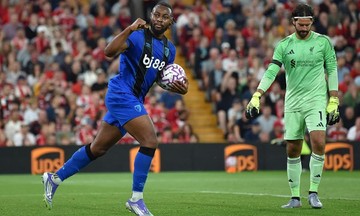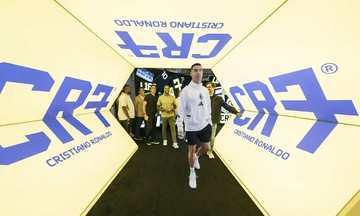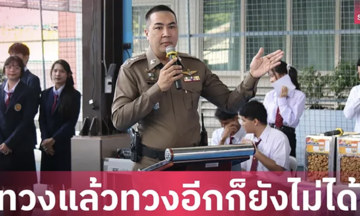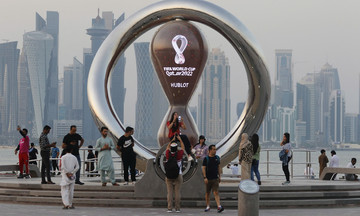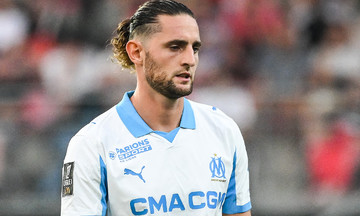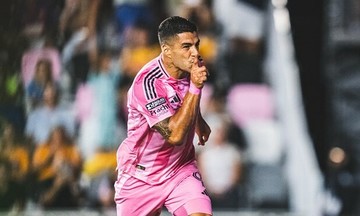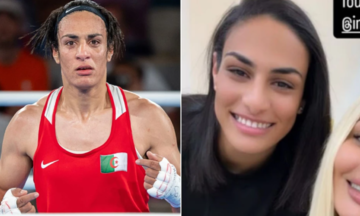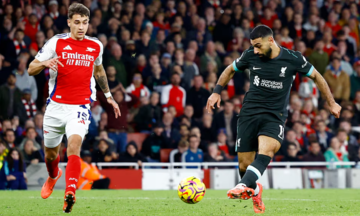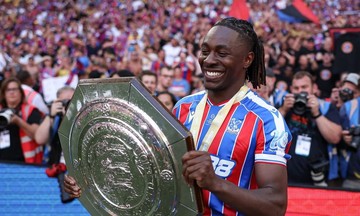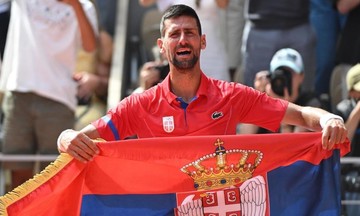Boca Juniors and River Plate's most memorable contribution to the 2025 FIFA Club World Cup was the vibrant displays of their fans, not their performance on the field. Both teams exited in the group stage, despite their supporters transforming every stadium they played in into a pilgrimage of Argentine soccer fandom.
The quality of soccer displayed by the Argentine teams was aptly summarized by Jack Lang in the New York Times after River's 2-0 loss to Inter Milan on 26/6: "Ugly soccer". As hopes of a comeback dwindled, River's play became increasingly desperate, culminating in Gonzalo Montiel's red card for loss of control. After the match, Marcos Acuna even chased Denzel Dumfries into the Inter locker room.
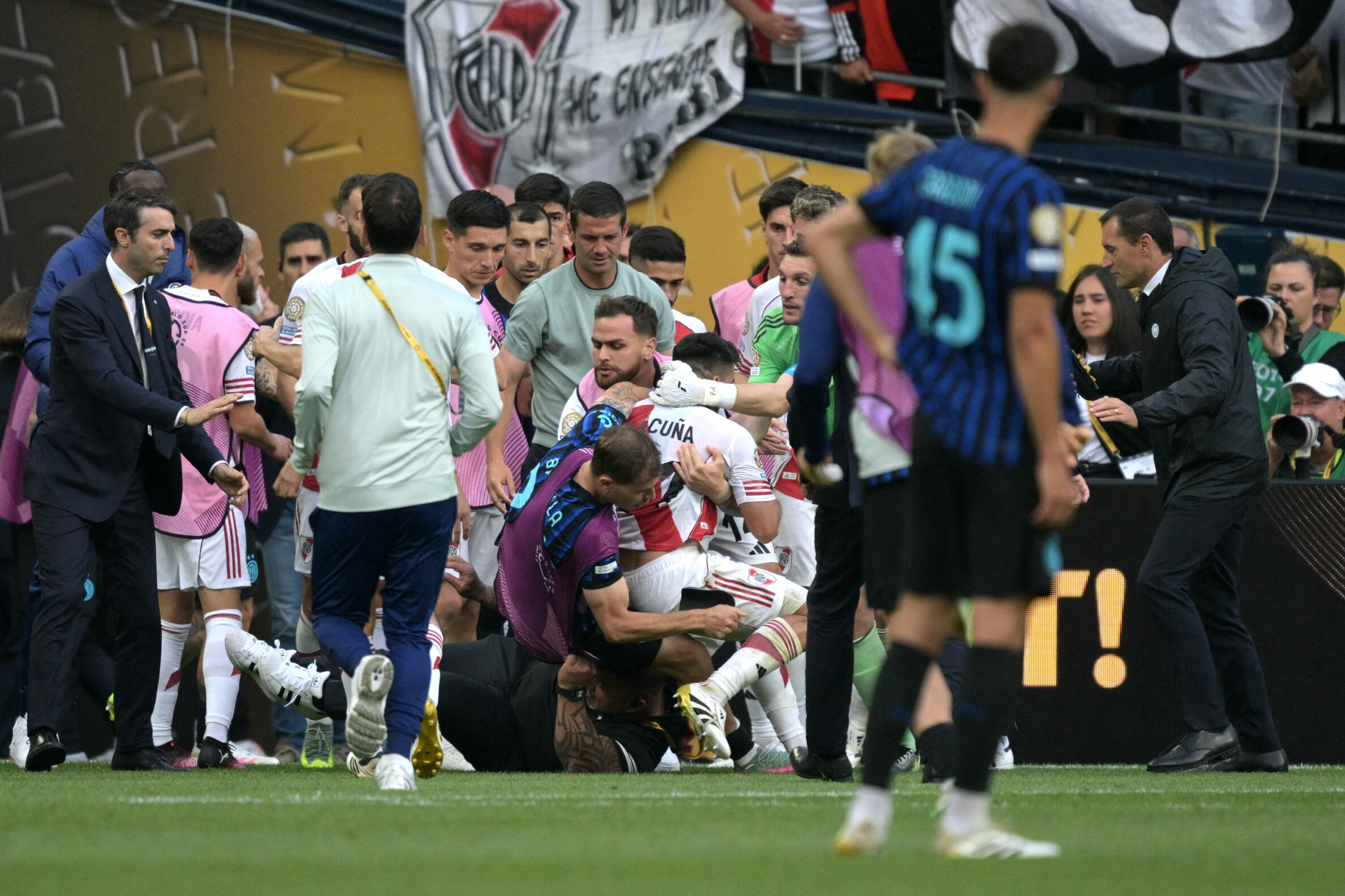 |
Acuna is restrained as he chases Dumfries into the locker room after River's 2-0 defeat to Inter in Group E of the 2025 FIFA Club World Cup on 26/6. Photo: AFP |
Acuna is restrained as he chases Dumfries into the locker room after River's 2-0 defeat to Inter in Group E of the 2025 FIFA Club World Cup on 26/6. Photo: AFP
Between them, River and Boca have won the Copa Libertadores, South America's equivalent of the Champions League, 10 times. In contrast, no Brazilian club has won it more than three times. Yet, at the Club World Cup, while the Argentine giants faltered, all 4 Brazilian teams advanced to the round of 16, two reached the quarterfinals, and Fluminense made it to the semifinals.
This disparity highlights Argentine club soccer's recent reliance on past glories. Since River's 2018 Copa Libertadores triumph, Brazilian clubs, including Flamengo, Palmeiras, Fluminense, and Botafogo, have won the title for the past 6 years. Notably, 4 of those finals were all-Brazilian affairs.
Criticism from the Argentine President
Following River's defeat by Inter, Argentine President Javier Milei criticized the management of Claudio Tapia, President of the Argentine Football Association (AFA). He pointed to the fact that all 4 Brazilian representatives, operating under the Sports Public Limited Company (SAD) model, advanced, while River and Boca, operating under the traditional Civil Association model, were eliminated.
"Our league is weak with 30 teams, lacks competitiveness, has no SADs, and lacks motivation. This model is unworthy of Argentina's amazing fans who fill stadiums worldwide. I emphasize, Tapia and his small circle are harming Argentine soccer," President Milei posted on Instagram.
However, of the 4 Brazilian teams that reached the Club World Cup's round of 16, only Botafogo truly operates under the SAD model championed by President Milei. Flamengo, Palmeiras, and Fluminense still maintain Civil Association structures, the only model currently accepted by the AFA.
Botafogo's model, and the club itself, is facing its own challenges. American businessman John Textor, who also owns a majority stake in Lyon, is the club's owner. Lyon was recently relegated to Ligue 2 by the French football financial authority due to financial instability, with debts of around half a billion USD.
Textor was previously sanctioned by FIFA for failing to pay any of the 21 million USD promised to Atlanta United for the transfer of Argentine player Thiago Almada. After a half-season in Brazil, the 2022 World Cup winner moved to France and currently plays for Lyon. Furthermore, Textor used Botafogo's 23 million USD prize money from winning the 2024 Copa Libertadores to alleviate Lyon's financial difficulties instead of reinvesting in Botafogo.
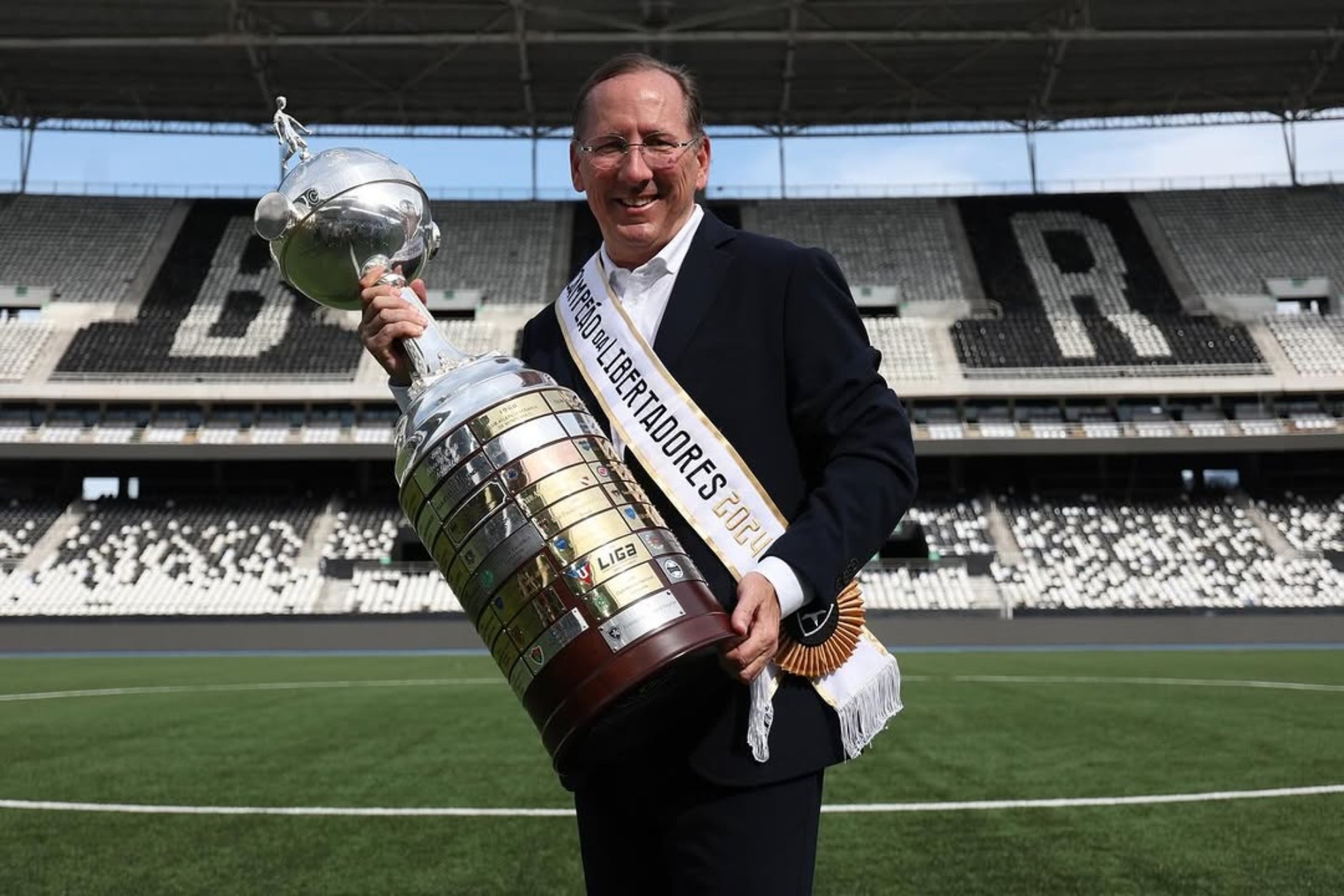 |
American billionaire Textor holds the Copa Libertadores trophy won by Botafogo in 2024. Photo: AFP |
American billionaire Textor holds the Copa Libertadores trophy won by Botafogo in 2024. Photo: AFP
Criticizing Argentine soccer solely based on River and Boca's group stage exits, or viewing this as a measure of crisis, is unconvincing. Beyond the Copa Libertadores, smaller Argentine clubs, like Racing Club, last year's champions, have found success in the Copa Sudamericana, South America's equivalent of the Europa League. And, of course, the Argentine national team are the reigning world and South American champions.
The Argentine soccer ecosystem differs significantly from Brazil's. This affects their ability to strengthen squads, attract talent, and retain young players. Argentina's population is around 45.5 million, while Brazil's is 211 million, a nearly 5 times larger market.
This difference is reflected in the television rights revenue Brazilian clubs receive, the prize money from the Brasileirao and the Brazilian Cup, their attractiveness to sponsors, and their transfer market activity. Additionally, Brazil has state championships at the start of the season, providing clubs with an early cash influx. Argentina lacks this.
Television Rights
After River and Boca's failures in the US, Argentine newspaper Ole commented, "We are playing poor soccer. That's why all 4 Brazilian teams advanced, and we didn't. One of the reasons? They have over 2 billion USD in revenue shared among 20 teams. We only have 1.4 billion USD… shared among 30 teams."
Based on these figures, each Brasileirao team receives an average of 100 million USD, while each team in the Argentine league receives only 46 million USD. The Brasileirao's television contract changed this season, with two companies, Libra and LFU, now sharing the broadcasting rights, replacing the previous sole holder, Globo. The total revenue reached 526 million USD, distributed among 20 teams.
In Argentina, the value of soccer broadcasting rights is practically a state secret. However, according to Clarin, the total contract value is only around 125 million USD, divided among 30 teams. For clubs like River and Boca, this revenue is negligible.
Stefano Di Carlo, CEO of River Plate and current presidential candidate, stated, "Television rights revenue is perhaps the lowest, comparable to the club's recreational sports and school programs. Currently, we receive about 5 million USD annually from television, while ticket sales and membership fees bring in 100 million USD, alongside 50 million USD from marketing activities."
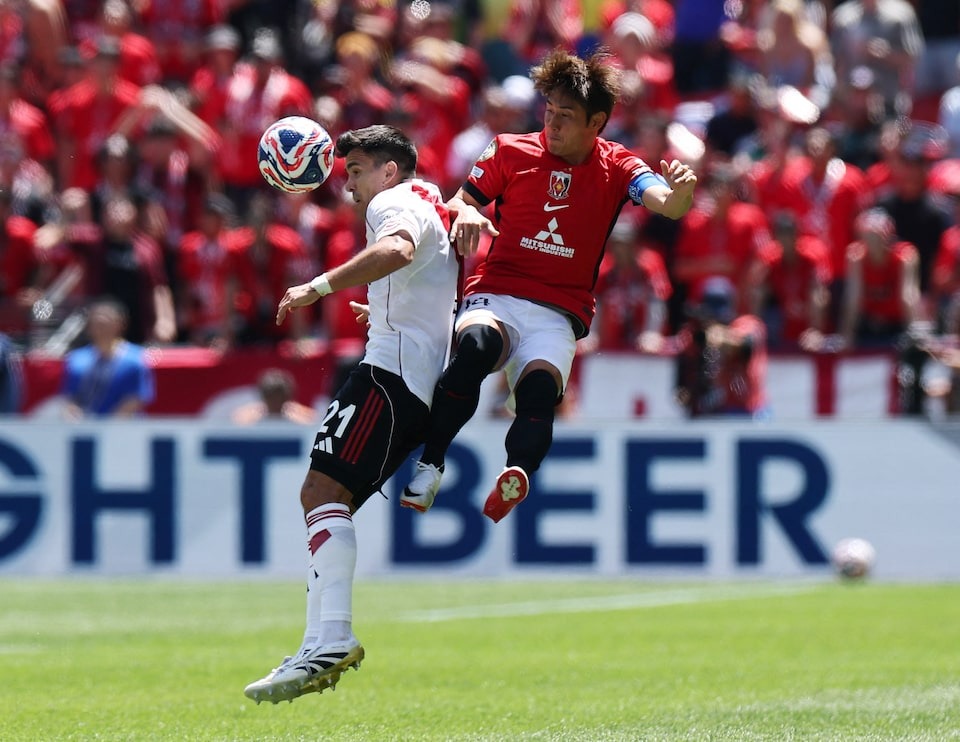 |
River defender Marcos Acuna (21) challenges Urawa Red Diamonds forward Takahiro Sekine during their Group E FIFA Club World Cup 2025 match at Lumen Field, Seattle, on 17/6. Photo: Reuters |
River defender Marcos Acuna (21) challenges Urawa Red Diamonds forward Takahiro Sekine during their Group E FIFA Club World Cup 2025 match at Lumen Field, Seattle, on 17/6. Photo: Reuters
According to Di Carlo, the current television rights model severely disadvantages River. "While the value of Argentine soccer broadcasting rights is comparable to Spain's, Atletico Madrid receives 200 million USD, while River receives only 5 million USD. This business needs a complete overhaul involving the private sector, the AFA, and the clubs. Currently, River can't compete globally because of the terrible structure of the television rights package," he said.
A former Argentine soccer executive, in an informal conversation with La Nacion, admitted, "The problem with our soccer is the 30 teams, not the corporate model."
Prize Money
The disparity between Argentine and Brazilian soccer is further evident in prize money. Platense, the recent Clausura (second half of the season) champions of the Argentine league, provides a case in point.
The Argentine Professional Football Association announced, "The champion receives 70% of the final match revenue, and the best player receives a cash prize." Platense President Sebastian Ordonez proudly displayed the 500,000 USD check the club received from CONMEBOL (the South American Football Confederation). The AFA, however, has never paid prize money to its champions.
While the final league standings influence television revenue distribution, winning the Argentine title offers significantly less financial reward than in Brazil. Botafogo, the most recent Brasileirao champion, received 8.7 million USD.
A similar situation exists in the Argentine Cup. In this nationwide competition, prize money is paid by sponsor Torneos. Official figures for the 2024-2025 season are unavailable, but based on the previous season, when Central Cordoba de Santiago del Estero won, the amount is astonishingly low.
Central Cordoba received only 69,473,774 pesos, equivalent to 58,103 USD at the current exchange rate, for defeating Velez Sarsfield in the final. Based on the agreed prize structure with the AFA, the 2024-2025 Argentine Cup winner's prize money will be similar, adjusted slightly for accumulated inflation.
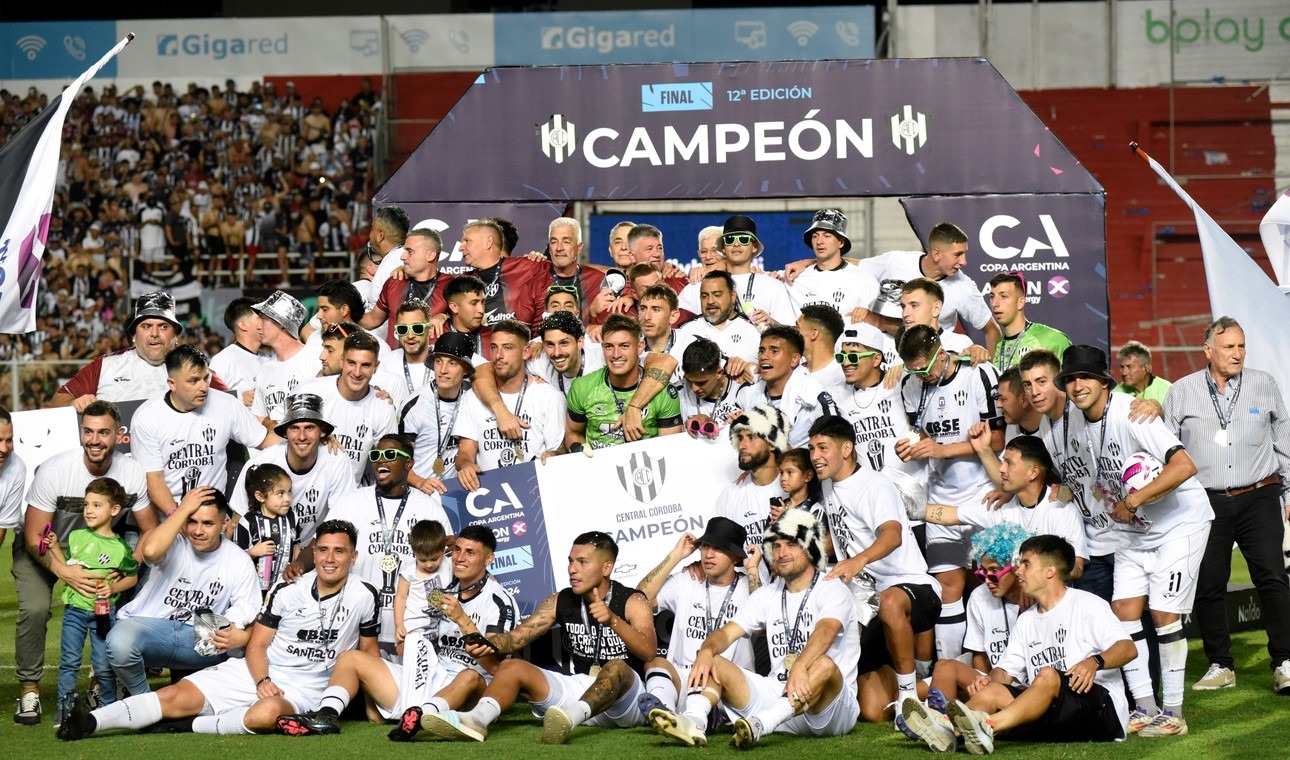 |
Central Cordoba received just over 58,000 USD for winning the 2023-2024 Argentine Cup. Photo: EFE |
Central Cordoba received just over 58,000 USD for winning the 2023-2024 Argentine Cup. Photo: EFE
Meanwhile, in Brazil, some teams even prioritize the Brazilian Cup over the league due to its lucrative financial rewards. The Cup winner receives 14 million USD. In total, the Brasileirao and Brazilian Cup titles alone provide over 22 million USD in prize money to Brazilian clubs.
Less Attractive to Sponsors
Of the four key revenue streams for soccer clubs: broadcasting rights, matchday revenue, commercial revenue, and other income, the commercial aspect, mainly from sponsorships, is crucial. Here too, Argentine soccer lags behind Brazil.
In April, River Plate announced a new main sponsorship deal with Betano, featuring their logo on the team's jersey until mid-2027, for 6 million USD annually. Although this represents an 80% increase over the previous contract, it's significantly lower than what at least half of the Brasileirao teams receive.
Boca receives about 7.3 million USD per year from Betsson. Racing, the recent Copa Sudamericana and Recopa Sudamericana champion, receives a more modest sum of around 2.2 million USD annually, also from Betsson.
In Brazil, main sponsorships command significantly higher values due to the robust market, the boom in betting companies, and the professionalization of club management. Flamengo leads with a 21.1 million USD annual deal with Pixbet, the largest in Brazil. Corinthians receives around 19 million USD from Esportes da Sorte, while Palmeiras earns approximately 18.3 million USD from Sportingbet. These top three Brazilian deals alone surpass the combined sponsorship income of Argentina's biggest clubs.
"This demonstrates the strength of the Brazilian market. I believe it's 5 times larger than Argentina's, which naturally reflects in sponsorship values," Rene Salviano, CEO of Heatmap and a sports marketing expert, told Brazil's InfoMoney.
In terms of sponsorship revenue, River and Boca are on par with rising Brazilian clubs like Fortaleza and Bahia, despite the Argentine giants' greater international influence, particularly in Europe. Gremio and Internacional, two other major Brazilian clubs, each receive 9 million USD annually from sponsors, surpassing their Argentine counterparts.
According to Alexandre Godoy, Head of Sponsorship and Advertising at Internacional, the recent legalization of betting in Brazil has fueled this growth. "Legal regulation provides security, social responsibility, and transparency for stakeholders, thus enhancing the brand value of the clubs," he told InfoMoney.
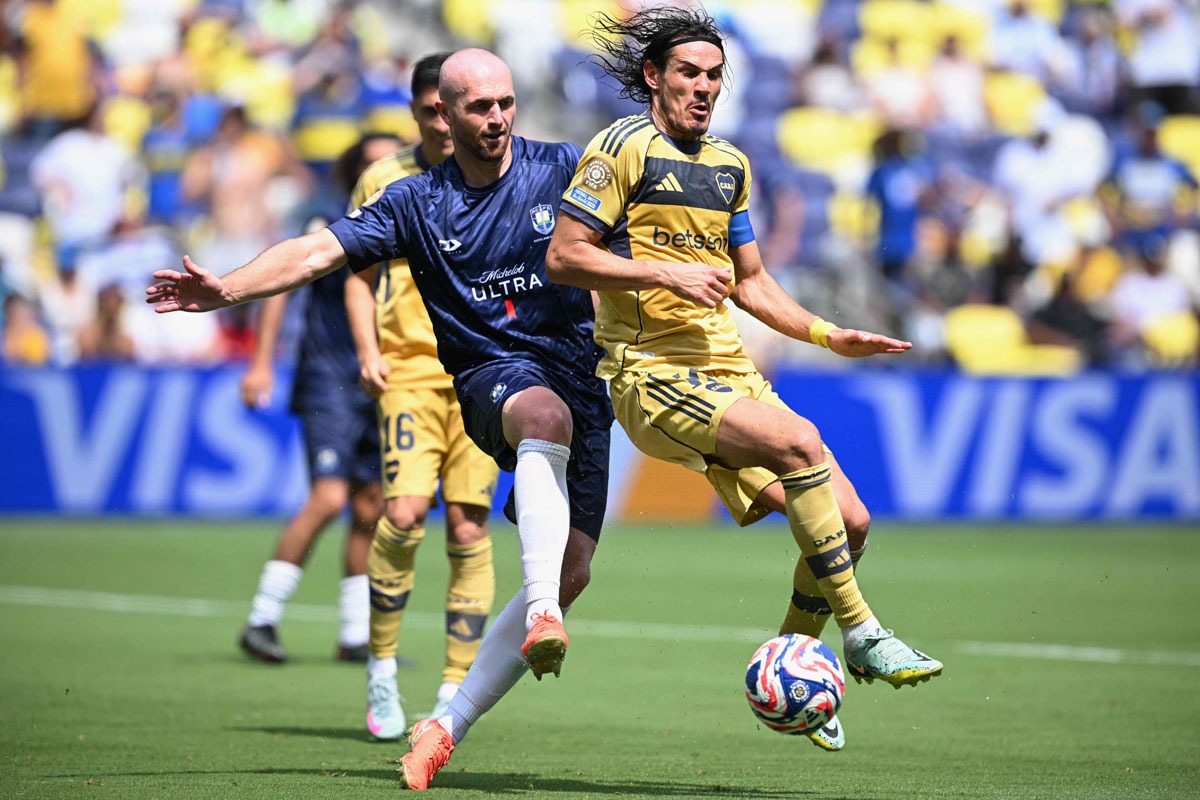 |
Edinson Cavani's Boca Juniors only earns 7.3 million USD annually from sponsor Betsson. Photo: AFP |
Edinson Cavani's Boca Juniors only earns 7.3 million USD annually from sponsor Betsson. Photo: AFP
Fabio Wolff, CEO of sports marketing agency Wolff Sports, attributes the disparity to the economic situations of the two countries. "The difference in sponsorship values stems from the larger investments by betting companies in Brazil, coupled with the larger population and higher average income," he said.
Sport Recife, newly promoted to the Brasileirao, recently signed their largest-ever sponsorship deal worth nearly 5.5 million USD annually, potentially rising to almost 13 million USD based on performance targets. While the fixed amount is lower than River and Boca's, Eduardo Arruda, Recife's Vice President of Marketing, considers it impressive for a newly promoted team.
"The increase in sponsorship values in Brazil isn't solely due to economic or technical factors but also to the restructuring of clubs into sports corporations, the modernization of stadiums and training centers. This provides reassurance to sponsors," he emphasized.
Thiago Freitas, COO of player representation and management company Roc Nation Sports in Brazil, believes cultural factors also play a role. "The proportion of income Brazilians are willing to spend on sports betting and gambling far exceeds any other nation globally," he said.
Transfer Market Weight
An unwritten rule in the transfer market – a young talent in Brazil is worth millions of USD more than one in Argentina – generally holds true. However, this season presented a notable exception: Franco Mastantuono. The youngster became the most expensive transfer in Argentine soccer history when Real Madrid signed him for approximately 53 million USD.
According to Transfermarkt, in June, Brazilian clubs sold 34 players for a total of around 88 million USD. Argentine teams, despite transferring 69 players, only generated 83 million USD. The Mastantuono deal alone accounted for 63.3% of Argentine soccer's total transfer value. Despite its prominence, Mastantuono's value doesn't reflect the general trend.
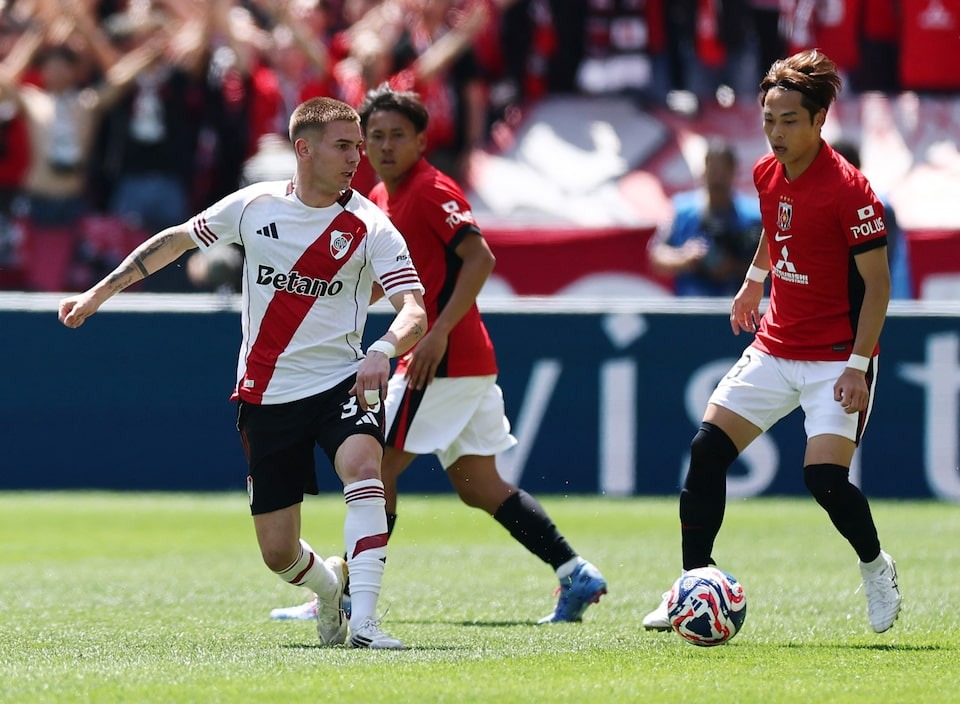 |
Midfielder Mastantuono (white shirt) brought River 53 million USD in his transfer to Real Madrid this summer. Photo: Reuters |
Midfielder Mastantuono (white shirt) brought River 53 million USD in his transfer to Real Madrid this summer. Photo: Reuters
During the South American transfer window from 12/2024 to 2/2025, the gap between the two countries was even more pronounced. Brazil transferred 454 players, both domestically and internationally, for a total of 320 million USD. Argentina had more transactions, with 581 players, but only generated 124 million USD, less than a third of Brazil's total.
Stability
Another factor is tournament stability. Under AFA President Claudio Tapia, since March 2017, the Argentine league's regulations have changed 9 times in over 7 years.
Most recently, the AFA abolished relegation for 2024. Brazil, meanwhile, maintains a simple model: 20 teams in the top flight, playing a single round-robin throughout the year, without groups or regional divisions, and with four teams relegated. Data from Brazil's O'Globo in 2023 indicated that Brazilian fans value this stability.
Compiled by Hoang Thong



